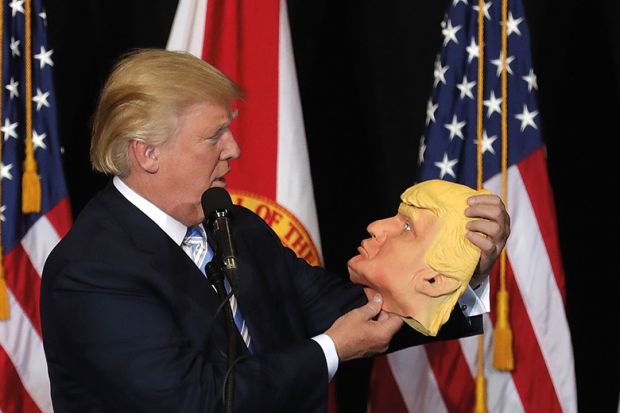Donald Trump’s policies could include scrapping the US Department of Education, cutting back or privatising federal student loans, rolling back regulation of for-profits and reversing recent guidance on campus sexual assault allegations in a war on “political correctness”, sector experts suggest.
Mr Trump will enter the White House without the kind of detailed plan on higher education set out by his Democratic rival, Hillary Clinton, who had outlined a proposal to make public college “debt free” by ending tuition payments for 80 per cent of US households.
Sara Goldrick-Rab, professor of higher education at Temple University and author of the recently published Paying the Price: College Costs, Financial Aid, and the Betrayal of the American Dream, said that Mr Trump had offered only “sporadic comments” on higher education during the campaign.
Professor Goldrick-Rab, known as a vocal critic of Republican higher education policy in the state of Wisconsin, said that it was “hard to know whether [Mr Trump] agrees with the GOP [Republican] platform or not – but the platform for the party on which he ran calls for ending the federal government’s involvement in student loans”.
“The federal government should not be in the business of originating student loans,” says the Republicans’ 2016 platform.
Until 2010, the bulk of student lending had been made by banks, backed by federal government guarantees. But under Barack Obama’s presidency, the federal government took on a much bigger role by making those student loans direct.
“I wouldn’t be surprised if he [Mr Trump] unrolled that,” said Professor Goldrick-Rab.
Alternatively, she suggested, Mr Trump could try to reduce loan debt owed to the government “by cutting people off from taking debt in the first place” by characterising certain social groups as “bad investments”. This would “reduce people’s ability to go to college”, she added.
Mr Trump said during the campaign that he would drastically cut or even eliminate the Department of Education.
Professor Goldrick-Rab said: “I’m very concerned about how he views the US Department of Education in general. He’s part of a party that’s attacked it quite substantially and believes the states, not the federal government, should be making education policy…I’m not sure there will be a department. I really am not.”
Under the Obama administration, the Department of Education, which began operating only in 1980, has been a “big player in trying to crack down on low-performing [for-profit] colleges that are taking advantage of students”, she added.
Alexander Holt, education policy analyst at the thinktank New America, said: “The places you’re going to see the most scale-back the quickest are the places where you saw the most expansion in terms of executive authority under the Obama administration – so that’s regulation of for-profit colleges, that’s civil rights. These are the easiest ones to change.”
Another such area is federal oversight of how universities deal with sexual assault allegations on campus. Official guidance issued by the Department of Education in 2011 – through what is known as a “Dear Colleague” letter – told higher education institutions that they must use the “preponderance of evidence” standard of proof when adjudicating sexual assault cases, rather than the higher bar of evidence that some institutions were using.
The 2016 Republican platform states that the Obama administration used the measure to “micromanage the way colleges and universities deal with allegations of abuse”, saying this “must be halted before it further muddles this complex issue and prevents the proper authorities from investigating and prosecuting sexual assault effectively with due process”.
Mr Holt said that moving on this would be “very easy for the Trump administration” via another official Dear Colleague letter.
During the campaign, Mr Trump said that “in the past few decades, political correctness…has transformed our institutions of higher education from ones that fostered spirited debate to a place of extreme censorship”.
“There are things the administration can do about quote-unquote ‘political correctness’,” said Mr Holt. In addition to measures on sexual assault allegations, another Dear Colleague letter could guide colleges “towards a less strict version” of rules around what constitutes hate speech, he added.
“That is one thing I think he is going to try to tackle…that [hostility to perceived political correctness] seems to be an essential component of his campaign,” he said.
Mr Holt thought it unlikely that Mr Trump would seek to privatise student loans, arguing that the move would require expensive subsidies for banks.
He argued that the idea of abolishing the Department of Education was “utter nonsense” and unlikely to happen, as it would require another department such as the Treasury to administer student loans and Pell Grants for poorer students without any experience of doing so.
Meanwhile, Mr Trump is still facing a lawsuit over fraud claims brought by former students at his now-defunct “Trump University”.
Mr Holt said that the institution “wasn’t a university” and was thus never subject to regulations on for-profit colleges. But he added: “You can see in his [Mr Trump’s] business dealings and the way he talks about Trump University that he will almost certainly be sympathetic to the struggles of the for-profit industry in the face of the Obama administration.”
Mr Holt also suggested: “My guess would be you’re going to see an increase in applications of [US] people applying to universities in the UK…If you look at the number of young people who are so upset about this [Mr Trump's victory], I would just expect that a lot of people are going to want to leave.”
POSTSCRIPT:
Print headline: Experts sift ‘sporadic comments’ for clues to policy direction
Register to continue
Why register?
- Registration is free and only takes a moment
- Once registered, you can read 3 articles a month
- Sign up for our newsletter
Subscribe
Or subscribe for unlimited access to:
- Unlimited access to news, views, insights & reviews
- Digital editions
- Digital access to THE’s university and college rankings analysis
Already registered or a current subscriber? Login








